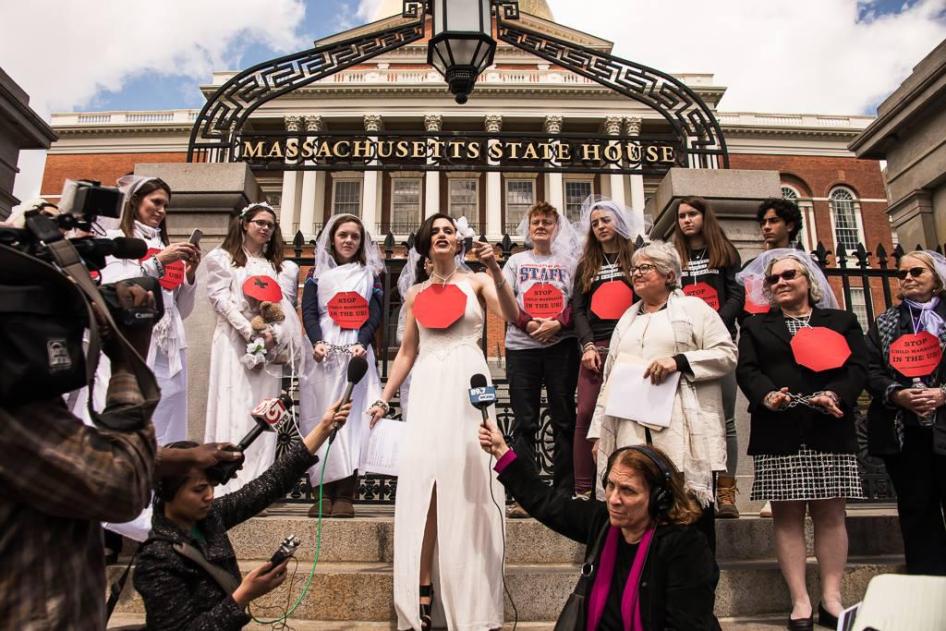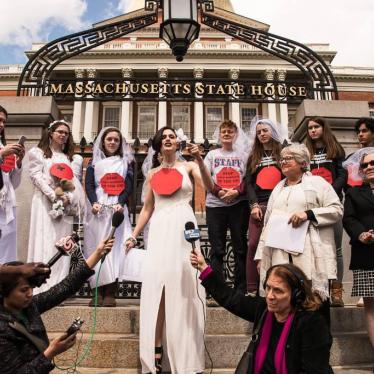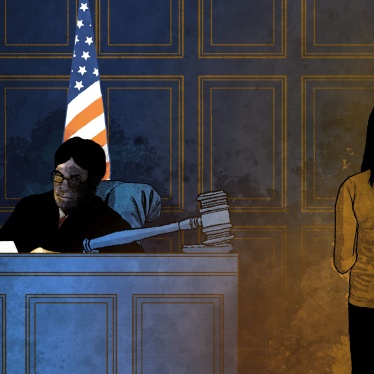On June 26, activists in wedding dresses and chains gathered at the State Capitol in Harrisburg, Pennsylvania, to press for passage of a bill to ban child marriage. Some wore tape across their mouths.
“Arms chained, mouths taped, trapped, silenced,” said Fraidy Reiss, executive director of the group Unchained at Last.“This is what life looks like for girls and women right here in Pennsylvania who are forced to marry.”
Incredible as it sounds, only two U.S. states have banned child marriage outright. Many others set the minimum age at eighteen but include exceptions with no minimum age. In Pennsylvania, for instance, the law allows parents or guardians to sign off on marriages for those under eighteen and courts can authorize the marriage of children under sixteen if it is deemed in their “best interest.”
According to Reiss, as of 2014 there were a least 2,000 women living in Pennsylvania who had been married before age eighteen.
The United States has lagged behind the global legal reform trend on child marriage, but this is starting to change. In 2018, New Jersey and Delaware became the first states to fully outlaw child marriages, with no exceptions. Bills to ban child marriage are pending in nine states.
The House bill to make Pennsylvania the third U.S. state with a complete ban passed unanimously, 195-0, and is now before the Senate for consideration.
Child marriage is deeply harmful. It puts girls, who are much more likely to be subjected to child marriage than boys, at risk of negative health outcomes, curtailed education, poverty, and domestic violence. Child brides experiencing domestic violence may face difficulties in retaining a lawyer, filing for divorce, or seeking shelter.
I’ve seen up-close the grave harm child marriage causes. Both of my grandmothers were child brides, in Trinidad and Tobago respectively. They were forced by their families around ages thirteen and sixteen to marry adult men they had never met. Both had early pregnancies, gave birth to seven and eight children respectively, and experienced the loss of a child shortly after birth. No one asked whether this was what they wanted. Returning to their families was not an option.
Sadly, my grandmothers’ experiences of child marriage decades ago are being replicated today. As of March 2018, UNICEF reported that some 12 million girls around the world marry before age eighteen each year.
Many countries are working to end child marriage by 2030, in line with the UN’s Sustainable Development Goals. Trinidad and Tobago outlawed child marriage in June 2017. Other countries are doing the same.
This is paying off. According to UNICEF, during the past decade, the proportion of young women who were married as children decreased by 15 percent. That’s good news, but there’s still much more to be done, including in the United States.
In addition to Pennsylvania, bills to prohibit marriage before age eighteen—without exception—are pending in Massachusetts, Oregon, Washington, Minnesota, Michigan, Connecticut, South Carolina, and New Hampshire. U.S. lawmakers in these states should make these bills a priority and send them forward quickly for a vote.
I often think back to my adolescence, and how different it was from my grandmothers’ experiences. I spent those years going to school, learning music, hanging out with friends, playing cricket and soccer and later studying to become a lawyer. My grandmothers and mother encouraged me to enjoy my childhood and seize opportunities they were denied.
No child, in the United States or anywhere, should go through what my grandmothers endured. Lawmakers here should do their part by outlawing child marriage, and letting kids just be kids.








